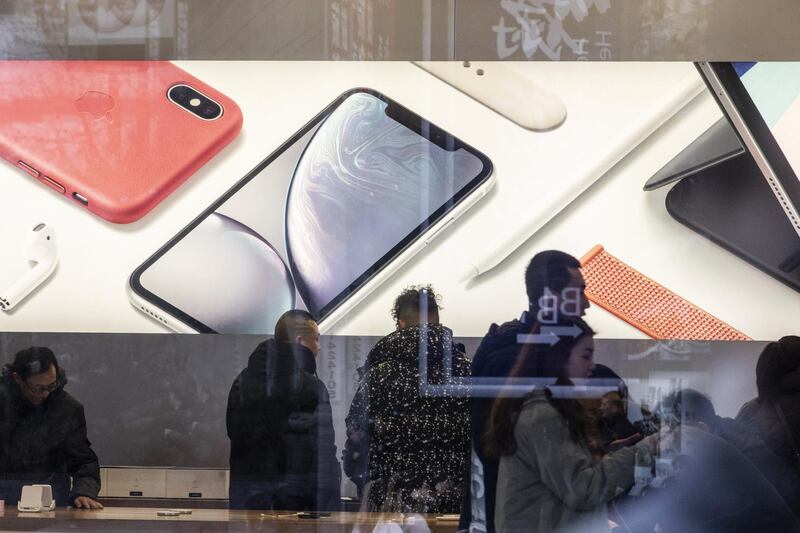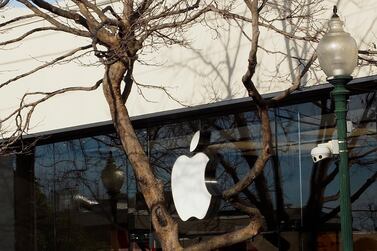Mounting competition, little room for innovation and customers' reluctance to upgrade will haunt the smartphone industry, which expects very little, or no growth this year.
Apple is feeling the most heat from its competition, especially in China, the world's biggest smartphones market, as sales of its expensive iPhones drop. Global smartphone vendors shipped 376 million units in the fourth quarter of 2018, a year-on-year dip of nearly 6 per cent, according to research company Strategy Analytics in Boston.
This was the fifth consecutive quarter of year-on-year declines for the global smartphone market, which raises questions about its future.
International Data Corporation in Massachusetts expects the smartphone market to experience low single-digit growth from 2019 until 2022.
Apple, which reported revenues of $84.3 billion (Dh309.6bn) in the holiday quarter on Tuesday, suffered a massive plunge in the sale of its star smartphones. iPhones’ revenues dropped 15 per cent to $52bn in the quarter that ended December 29.
From the last quarter, Apple has stopped reporting iPhone sales figures. According to Strategy Analytics' estimates, Apple shipped only 65.9 million iPhones globally in this quarter, a 15 per cent year-on-year drop.
Industry experts said Apple failed to acknowledge the weak economic conditions in various emerging markets, especially China, leading to a drastic dip in iPhone sales.
"This time Apple did not recognise enough the prevailing difficult situation in China," Annette Zimmerman, vice president and an analyst at researcher Gartner said.
Apple did not come up with the right products to address gaps in the portfolios to compete with Samsung's Note.
The gloomy economic condition discouraged people from upgrading, she said.
Apple is not the only smartphone maker in trouble. Rival Samsung, which has the biggest share of global smartphones market, is struggling equally. "Smartphone demand is stagnating, as consumers choose to hold on to their existing devices for longer," said Matthew Kendall, chief telecoms analyst at Economist Intelligence Unit in London.
Samsung, which also suffered sales drop, is taking remedial action. The company is developing a fourth variant of the S10 that will be 5G-enabled and will launch on February 20 in the US.
"The new roll-out shows Samsung is swiftly moving up the value chain," Sam Blatteis, chief executive of The Mena Catalysts, which advises technology companies on policy and government affairs in the region, told The National.
"The company is playing the 'long-game' in the Middle East. Samsung is highly competitive in the Middle East at their price point … they are playing to win," he said.
However, increasing standardisation of smartphone devices and the difficulty in creating more innovative models will prove to be challenging for the likes of Apple and Samsung, according to Mr Kendall.
Chinese smartphone manufacturer Huawei, which is facing mounting pressure over espionage accusations from the US, Australia and UK, is another worry for Apple as the company is threatening the American giant's market share in China.
Huawei's domestic shipments increased by more than 23 per cent year-on-year as its market share rose to 27.8 per cent in China in the last quarter of 2018, according to Strategy Analytics. Whereas iPhone shipments to China dropped by more than 22 per cent to 10.9 million units in the same period.
“However, it [Huawei] is struggling to make headway in western markets, owing to an ongoing dispute with several western governments,” said Mr Kendall. It is no “threat” to Apple’s global “supremacy”, he said.
“To challenge Apple’s supremacy, Huawei needs to be able to gain the trust of both national governments and consumers in markets such as the US, which is proving to be immensely difficult,” he said.
Analysts say Apple has already started to move towards services business – giving it an edge over its competitors.
“Apple is investing in services for a long time and much more than its competitors,” Ms Zimmerman said.
“Samsung is doing minimal, Huawei is also not investing much [in services]… Xiaomi [comparatively smaller] is one vendor that is doing much. Therefore, if things go well then as a big vendor, Apple can leap big out of this sector.”
Contribution of services to Apple’s 2018 fiscal revenues was 13.9 per cent and analysts have predicted it could touch 15 per cent in 2019 financial year.








